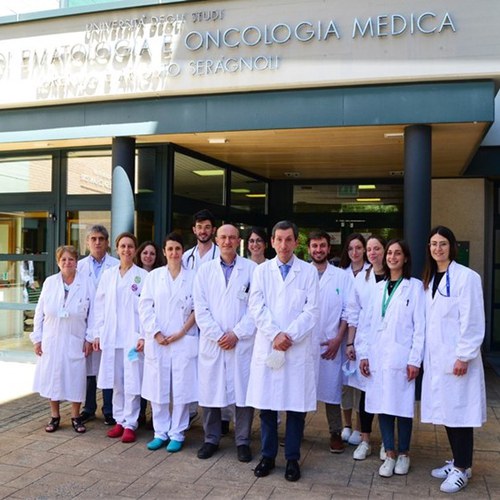Research field
Acute Leukemias and Myelodysplastic Syndromes.
General research project
clinical and translational research for Acute Leukemias and Myelodysplastic Syndromes.
Ongoing research projects
- Outpatient management through home care of patients with AML who are unfit for conventional chemotherapy: quality of life, infectious risk, and rationalization of resources (PI Curti)
- Genomic-Transcriptomic characterization and extended mutational analysis to decipher the intrinsic and extrinsic patterns of resistance of FLT3 positive Acute Myeloid Leukemias and evaluate the genetic-molecular or immunological vulnerabilities susceptible to future target / combined therapeutic approaches (PI Curti)
- Precision dosing of FLT3 Inhibitors in AML (PI Curti)
- Study of new on-treatment biomarkers of responses to conventional chemotherapy in patients with AML: the role of the absolute number of lymphocytes (PI Curti)
- Evaluation of predictive factors of long response to hypomethylating treatment in patients with high-risk myelodysplasia (PI Paolini)
- Infusion of alloreactive Natural Killer (NK) cells as a consolidation strategy in elderly patients with acute myeloid leukemia (PI Curti)
- CD22 fluorescence intensity as a predictor of response to Inotuzumab Ozogamicin therapy in relapsed / refractory acute B lymphoblastic leukemia (PI Papayannidis)
- Analysis of resistance mechanisms and predictive markers of response in patients treated with Inotuzumab Ozogamicin with relapsed / refractory acute B-lymphoblastic leukemia (PI Papayannidis)
- Role of the double transcript in the monitoring of Philadelphia positive Acute Lymphoblastic Leukemia (PI Papayannidis)
- Personalized medicine approach in patients with MDS: characterization of the patient's molecular profile to improve clinical decision making and systematic collection of data in a "real world" setting in order to improve the quality of health care (PI Finelli)
In order to guarantee that patients can be treated with the most modern drugs, the group is committed to conducting phases I , II, and III clinical trials for a total of 25 studies—some sponsored by pharmaceutical companies and some not, both single- and multi-center. Observational, tissue, and interventional studies promoted by the Institute are also ongoing, such as the Hemaomics protocol, aiming to identify biomarkers that can play a role in the pathogenesis, evolution, pharmacological sensitivity, and prognosis of acute leukemia and MDS. In addition, two clinical trials are ongoing to evaluate the feasibility and clinical efficacy of an adoptive immunotherapy strategy with alloreactive Natural Killer cells; one is for elderly patients not suitable for the transplantation of allogeneic stem cells who have achieved complete remission, and the other is a therapy for minimal residual disease in patients who are candidates for allogeneic transplant.
As for MDS, the group collaborates in several international research projects, such as Harmony and Harmony Plus and coordinates the activity of the Regional Registry for MDS. Moreover, the research group takes part in the International Working Group for Prognosis in MDS (IWG-PM), promoted by the MDS Foundation in collaboration with Memorial Sloan Kettering Institute (NY, USA) and in the Eurobloodnet Project (European Reference Network) for Rare Diseases. A long-standing collaboration is also in place with the Institute of Human Anatomy of Bologna University.
